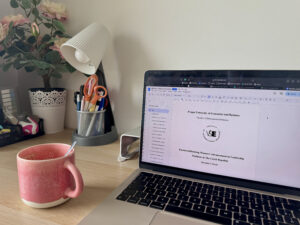Mastering Your Thesis Without Losing Your Mind | by Michaela & Anna
For many students, the bachelor’s OR master’s thesis feels like a mysterious and daunting challenge. From choosing a supervisor to defending your research, the journey can be long and overwhelming. However, with the right approach, you can make the process smoother and less stressful. Based on our own experience, here are some key tips to help you navigate your thesis with confidence.

1. Do a feasibility study in your head before you choose a topic
Before you even propose a topic to your supervisor, take a moment to assess its feasibility. Ask yourself: Can I realistically conduct the necessary research and achieve my goals? A topic might sound exciting, but if the practical requirements are beyond your reach, you’ll run into serious roadblocks. For instance, if your research requires surveying 200 respondents, but you struggle to find enough participants, you’ll be stuck. Similarly, analyzing Mongolia’s business environment is impractical if you don’t have any contacts or resources related to Mongolia. Be realistic about what’s achievable, and only then finalize your topic.
2. Learn from other’s mistakes
One very special feature InSIS has, is the possibility for you to check how your supervisor has graded different thesis in the past. Look for past theses similar to your topic and study the feedback they received (from both the supervisor and the opponent). This insight can help you avoid common mistakes and better understand your supervisor’s expectations.
3. Constantly talk to your peers about their thesis
There is a possibility that some people, including your own classmates, may already have a bachelor’s OR master’s degree and have written a thesis before. So, get some tips from them about how their thesis is going and get as many tips as possible, from the literature review to the data collection and what common mistakes to avoid when writing a thesis, as they have the experience of doing so.
4. Fake deadlines are your best friend
Is the deadline to submit your thesis project on 30th of January? No it is not. While that deadline stands for the Insis system or Moodle, your deadline should be 2 weeks (1 month if your supervisor is strict) before. The truth is, your final draft is never really final. There will always be something to refine, correct, or improve. Also, don’t expect your supervisor to approve your first draft immediately. Leaving extra time for revisions ensures that you won’t be scrambling at the last minute.

5. AI is your best friend AND your worst enemy
Using AI tools like ChatGPT can be incredibly helpful for brainstorming and structuring your thesis. However, be cautious. AI often generates inaccurate information or completely fabricates citations. I’ve personally encountered that AI gave me citations that were nowhere to be found in the sources it provided. So use it, but with caution and visely.
6. Start your Data collection EARLY!
One of the biggest challenges of writing a thesis is collecting data relevant to your thesis. So it is incredibly important that you figure out what is the best method to collect data relevant to your topic. If you’re thinking about doing interviews and surveys, make sure that you have potential contacts or platforms to reach out to. If you are developing your own questions, make sure you are phrasing the questions correctly, but also, be flexible, because sometimes during the interviews, based on the responses you are getting from the interviewee, you will have to change up your questions to get more information. But during this period, make sure to review the data quality and also run it by your supervisor. This will help to check the quality of the data and see if any changes need to be made mid-way.
And move fast! This is the portion that takes the longest time for any student doing their thesis. Set internal deadlines for yourself, to make sure you have enough time to research the data and add them to your thesis to make proper conclusions!
7. USE the consultation hours
Meeting regularly with your supervisor can save you from endless revisions and last-minute panic. Supervisors appreciate students who are proactive and engaged in the process. My suggestion would be to go 1-2x per month, to review your aim, title, and drafts of your chapters. Also, keep in mind that every supervisor has their own citation preferences, clarifying these early on can save you a lot of time having to re-cite 20 pages a day before the deadline.
8. USE a citing software
Citing sources manually is time-consuming and prone to errors. Instead, use citation management software like Mendeley, Zotero, or EndNote to keep track of your references. Also, pay attention to the recency of your sources. Theses have received poor reviews simply because their references were outdated. If your research topic is current, ensure your theoretical framework is based on the most recent studies.